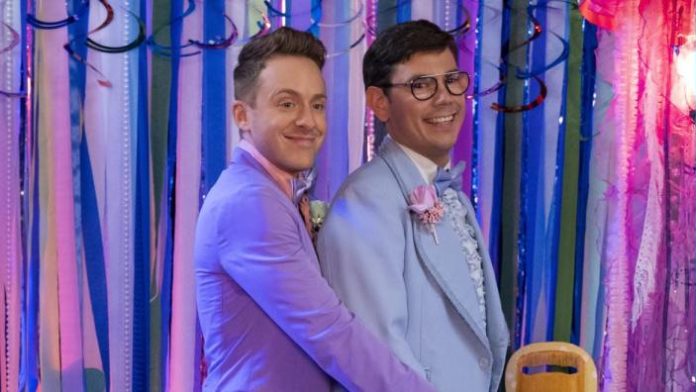
This is a preview of our pop culture newsletter The Daily Beast’s Obsessed, written by senior entertainment reporter Kevin Fallon. To receive the full newsletter in your inbox each week, sign up for it here.
Special is one of those TV series that is “important,” which sounds so insufferable and pretentious—especially because the Netflix show, which returned for season two this week, is anything but that. But it’s also one of those series that is doing important storytelling—that word again…gross…—in so many different ways that focusing on just one does a disservice to the others.
The comedy is created by and stars Ryan O’Connell, a comedy writer in Los Angeles who gained fame and critical attention with the release of his memoir I’m Special: And Other Lies We Tell Ourselves, about his experience as a millennial gay man living with cerebal palsy.
The series has essentially the same logline. It chronicles his attempts at dating and having a sex life, his possibly codependent relationship with his mother (Jessica Hecht), and his attempts to accept the ways in which his life is and isn’t defined by his cerebral palsy.
That dumb word again: It’s important because of the spotlight it gives to the disabled community, with a moving and insightful storyline in season two featuring a disabled support group. Their vibrant lives make Ryan interrogate the ways his worries about other people’s comfort around his existence have robbed him of his own comfort and happiness.
A lot of space is given to his mother’s storyline, exploring how a caretaker’s life is impacted by that duty and calling, and what happens when those services are no longer needed. Ryan’s best friend, Kim (Punam Patel) who, for all these wordy explanations about thematic importance, it must be said is hilarious, considers the ways in which conversations about body positivity have triggered her own feelings about self-worth.
Then there’s the sex.
Special may be the most insightful series there has been about gay sex and dating, which one might not expect based on its sunny branding and the assumption that you’ll be watching inspiration porn. While not exactly porn of the other kind, its sex scenes are realistic, occasionally graphic and certainly sexy. But in that realism, they may even be educational.
And that’s just not in how they reveal the mechanics of gay sex, perhaps to some straight viewers for the first time. But they also show how gay sexual relationships are navigated, the pressures and expectations, the negotiations, the anxieties, as well as the pleasures. Because of Ryan’s cerebral palsy, all those considerations are more complicated.
In an interview with the Huffington Post, O’Connell said, “I want gay sex and Special to be synonymous. I want my show to be known for topping, bottoming, top anxiety, lube―all those things. I want to take the mystery and shame out of gay sex by depicting it as I’ve experienced it: erotic, humiliating, empowering, funny and intense, all within the same thrust.”
It’s also refreshing that the series, in its concerted effort to skirt, again, these ideas of “inspiration porn,” allows its gay characters including Ryan to be toxic. Gays no longer have to be model citizens on TV in order to be enjoyed or interesting. How nice!
Season 2 sees Ryan brave the waters of dating someone (named Tanner) in an open relationship, a depiction of queer non-monogamy that, while common in the real world, is rare on TV. Tanner is played by excellent new cast member Max Jenkins, whose performance alongside Heléne Yorke on High Maintenance is a master class of chaotic comedy acting.
Tanner and Ryan are so cute together, but also so wrong for each other. You root for them and you boo them. It’s blurred lines in a series with themes—disability, homosexuality, codependence—that are typically on told in bold, unequivocal terms. It’s messy and it’s funny and sometimes painful. Which is to say, it’s real.


Special was nominated for four Emmys for its first season, including nominations for O’Connell, Hecht, and Patel. (Taking advantage of eligibility quirks, it was submitted as a short-form series.) It’s clearly gotten notice. But it would be nice for its reach to expand even more in season two.
It’s a series that takes topics so often reduced into one acceptable way to talk about them. If it’s still rare for gay character to be given a full life—the good, bad, and ugly—on TV, then it’s almost nonexistent for disabled characters. A gay and disabled character? Forget about it.
But what I appreciate about the show is that, while it’s about all those things, it’s also not about those things at all. It’s a slice of life for an interesting character who is surrounded by interesting people whose own interesting lives are explored, irrespective of those identifying qualities, traits, or perceived marginalizations or limitations.
To stress again, it’s very funny, too. You could say—and sorry/not sorry for the incredibly corny observation that’s about to follow—it’s special. Most of you only watch truly horrible content on Netflix. I know you do. Maybe watch something good instead.
Get our top stories in your inbox every day. Sign up now!
Daily Beast Membership: Beast Inside goes deeper on the stories that matter to you. Learn more.








